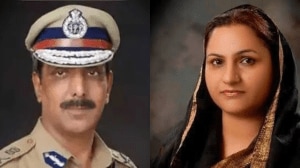Of offices and profits-I
No one’s talking about this sacrifice. Officials involved in drafting the office of profit ordinance...

No one’s talking about this sacrifice. Officials involved in drafting the office of profit ordinance many Congress leaders claimed didn’t exist worked through the night, in great secrecy and under great pressure—The Indian Express story on the ordinance was out and politics had reached a boil. But what happened? All that stress and hard work went to naught after Sonia Gandhi resigned and the ordinance became moot. And to think that the officials had to change even the way they travelled to work the day they were drafting the final version of the ordinance. The Express story had made certain UPA strategists nervous that the officials might be followed if they rode in standard sarkari cars. So a fleet of private cars ferried the babus to Law Minister HR Bhardwaj’s official residence. Bhardwaj, of course, is an old hand at quick and efficient interpretation of law in larger national interest.
Of offices and profits-II
So who had advance notice of the sacrifice? The children, close advisors, the PM (in that order?) and the CPI(M) general secretary. Even as most Congress ministers and leaders were gasping, Prakash Karat and Sitaram Yechury had already discussed the issue threadbare. Why in that case, you may ask, did the CPI(M) big guns take one whole day to react? Because, Sonia’s ‘‘politics of principle’’ is rather less important for the Marxists than Kerala’s politics of principals. A crusty old Stalinist was sulking there because younger men with funny ideas were catching the Politburo’s eye. With VS Achuthanandan and Pinarayi Vijayan locked in a classic Marxist ideological struggle, the drama in Delhi was just that for CPI(M) leaders. So, Karat and Yechury were down South the day Congressmen were wailing outside 10 Janpath. Just goes to show, perhaps, why the CPI(M) is the most organised political party in India.
Of offices and profits-III
Or, perhaps not so organised. The CPI(M) leadership didn’t keep in the loop party MPs alleged to be holding that lethal second job. The party had decided no one would sacrifice anything, but hadn’t told its MPs of the strategy. Since most MPs were back in their constituencies after Parliament was adjourned sine die, they didn’t know how to react to the news of Sonia’s resignation. Some decided they should be logical, explaining why their offices didn’t bring them any profit. Thankfully, the media was consumed by the 10 Janpath story. Otherwise, someone would have noticed that while CPI(M) leaders were saying their MPs had nothing to explain, the MPs were handing out earnest explanations.
Of offices and profits-IV
ND Tiwari had sent in his resignation to Sonia Gandhi, pleading advancing age rendering him unsuitable to rule Uttaranchal. Sonia hadn’t accepted her resignation. When Tiwari paid his solidarity visit to 10 Janpath, an AICC operative had an interesting take: perhaps Tiwari now wants to change his resignation letter, citing moral grounds as the reason for his quitting office.
Head liners
Was this an NSG VVIP protection strategy? When the PM visited the Golden Temple, that beautiful complex was a sea of sky-blue turbans. Sky-blue is the PM’s favourite colour when it comes to turbans. Plenty of devotees anxious to get a glimpse of one of Punjab’s most successful sons thought they had got their darshan when they spotted a sky-blue turban. One gentleman pointed to a tall, broad-shouldered Sikh in a sky-blue turban and told his friend, ‘‘There’s the PM.’’ Well, they do say Dr Singh is growing in the job.
Industrious minister
Ashwini Kumar, a Family loyalist who was only recently rewarded with a minister of state’s job, was thrilled when he landed in Amritsar with Manmohan Singh. For one, he was one of the few people asked to accompany the PM. Second, the PM’s Punjab trip was happening in the afterglow of the Sonia resignation. Kumar was ready with dozens of cracking soundbites; Amritsar was awash with TV reporters. But the newly appointed minister realised the downside of a government job: plenty of industrialists and big traders had lined up to meet the PM and most of them had long lists of complaints and demands. Naturally, it was not for the PM to handle all that. That’s why the minister of state for industry, Kumar, had been invited to come along.
Democracy’s own country
What if you can combine holiday, work and serving democracy in an all-expenses-paid trip? Such a wonderful opportunity has come about because Kerala is heading for elections. Election observers are all IAS officers. Since Kerala’s elections are generally peaceful, fair and since the state is a tourist’s delight, babus are queuing up to serve democracy. Their appetite has been whetted by the story that when the state went to polls in 1996, an IAS couple from Bihar spent their honeymoon there as election observers. But supply far outstrips demand this time. Kerala has one general observer for every two constituencies and only 30 expenditure observers. Bengal, on the other hand, has a general observer for each constituency and an expenditure observer for each sub-division. Plus, the state is bigger. So, plenty of vacancies for election observers. But there are very few takers. Just goes to show how much more Buddhadeb Bhattacharya has to do.
Lawyers under a tax
So when do you think lawyers will finally pay the service tax? Along with doctors, lawyers are still not under the net. This, when even hairdressers are paying the tax. Don’t jump to conclusions because P Chidambaram is a lawyer, and a very sought-after one at that. The FM told the Upper House during the budget debate that he would welcome a bill to put lawyers under the service tax so long as it came from someone else. Being a lawyer myself, the FM said, I want to excuse myself from the debate. He suggested that some other lawyer-MP could do the needful. Ram Jethmalani could move the bill, Ravi Shankar Prasad could second it. We are waiting.
Flying high
Here’s a question no one has asked about the Air India-Indian (Airlines) merger. What will happen to a plush, four-bedroom house in Vasant Vihar and two spanking new Baleno cars? These are among the acquisitions of the new IA CMD, Vishwapati Trivedi, an MP cadre IAS officer. Trivedi, just a few months in his new job, is rewriting the rules of executive perks. His predecessors were mostly content with such creature comforts as were thought suitable for joint secretaries. But Trivedi has not only upgraded his residence but is also in the process of redesigning his office. Mind you, it’s not that he wants to appear extravagant. He has sent out a team to survey offices of other PSU chiefs. The official line is that the new office will be within accepted parameters. Not all of Trivedi’s officers are willing to believe that.
Presenting a problem
Here’s a poser for Pervez Musharraf watchers: What does the gift of a copy of Bhagvad Gita mean for bilateral relations? Especially considering the first daughter of Pakistan is a recent convert to Sri Sri Ravi Shankar’s Art of Living wisdom. Musharraf received the Gita during one of those how-to-bring-peace-to-Kashmir conferences. He had just finished articulating yet another new idea about solving the Kashmir problem when an Indian delegate went up to him and handed him the Gita. That intriguing gift was followed by another one, a volume detailing Jammu and Kashmir’s special constitutional status in India. Why can’t the MEA think up such cool ideas?



- 01
- 02
- 03
- 04
- 05




























